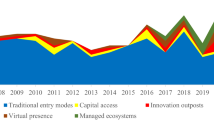Abstract
Being financed by venture capital is the prime economic basis of the enterprises of the New Economy. Investments by venture capitalists in innovative enterprises are planned with regard to the end or the „exit“. Venture capitalists’ pivotal concern is how to chip off — after a period of growth — their shares in an enterprise either by stock market flotation or by selling their shares to a larger enterprise or to other venture capitalists. The article introduces the concept of „exit-capitalism“ to indicate the diffusion of this exit-oriented logic to the founders, managers and employees of New Economy enterprises.
Similar content being viewed by others
Literatur
Arosio, Roberto, Giancarlo Guidici und Stefano Paleari, 2000: Why Do (or Did?) Internet-Stock IPOs Leave So Much „money on The Table“?, Sydney: Paper presented at the Australiasian Finance and Banking Conference, 18–20.12.2000.
Barrett, Amy, 1999: Internet Capital’s Young Turks, in: Business Week, 1.11.1999, S. EB 33–EB 39.
Barry, Christopher B., 1994: New Directions in Research on Venture Capital Finance, in: Financial Management, 23. Jg., S. 3–15.
Boldt, Klaus und Andreas Nölting, 2000: Der Stadtneurotiker. Hunziger Information AG, in: Managermagazin, H. 10, S. 90–100.
Byrnes, John A., 1999c: For Top Talent, How Green is the Valley, in: Business Week, 9.8.1999, S. 38–39.
Davis, Stan und Christopher Meyer, 1998: Blur. The Speed for Change in the Connected Economy, Reading, Mass.: Addison-Wesley.
Echikson, William, 1999: Home Field Disadvantage, in: Business Week E.Biz., 1.11.1999, S. EB 40–EB 41.
Echikson, William, 2000: A Blip — or a Bad Omen, in: Business Week, 3.4.2000, S. 22–25.
Fanselow, Karl-Heinz, 2000: Venture Capital, in: Jürgen von Hagen und Johann Heinrich von Stein (Hrsg.), Geld-, Bank-und Börsenwesen. Handbuch des Finanzsystems, 40. völlig überarb. Aufl., Stuttgart: Schäffer-Poeschel, S. 999–1018.
Gillies, Judith-Maria, 2000: Mach’nen Abflug. Boom-Markt E-Commerce. Nie war es leichter, im Nebenjob die eigene Web-Firma aufzuziehen. In: Bizz, H. 6, S. 38–43.
Gompers, Paul und Josh Lerner, 2000: The Venture Capital Cycle, London: The MIT Press.
Grose, Thomas K., 1998: A New Kind of Marketplace, in: Time, 10.8.1998, S. 45.
Grose, Thomas K., 2000: Swimming with the Big Fish, in: Time, 15.5.2000, S. 46–47.
Harmon, Steve, 2001: Aufstieg und Erfolg im Internet. Wenn aus Visionen Werte werden, München: FinanzBuch.
Haug, Wolfgang Fritz, 2000: Prolegomena zu einer Kritik der Neuen Ökonomie, in: Das Argument, H. 238, S. 619–645.
Henzler, Herbert A., 2001: Entwicklung von Unternehmensgründungen und volkswirtschaftliche Bedeutung, München: McKinsey Vorlesungsskripte LMU München.
Joh, 2000: Skandale wie im Taubenschlag, in: Bizz, H. 4, S. 10–11.
Kerstetter, Jim, 2000b: The Dark Side of the Valley, in: Business Week, 17.7.2000, S. 44–45.
Krafft, Lutz, 2002: Überlebenschance 10 Prozent, in: changeX.de/d_a00483print.html.
Lewis, Michael, 1999: The New New Thing, London: Hodder and Stoughton.
Malmsten, Ernst, Erik Portanger und Charles Drazin, 2001: Boohoo. A dot.com Story from Concept to Catastrophe, London: Random House.
Mandel, Michael, 2000: crash.com, München et al.: Financial Times Prentice Hall.
Mullaney, Timothy J., 2000: Still the Benchmark to Bet on?, in: Business Week, 7.8.2000, S. 56–58.
Ogger, Günter, 2001: Der Börsenschwindel. Wie Aktionäre und Anleger für dumm verkauft werden, München: C. Bertelsmann Verlag.
Pfeffer, Jeffrey, 2001: What’s Wrong With Management Practice in Silicon Valley? A Lot, in: MIT Sloan Management Review, 42. Jg., S. 101–103.
Ritter, Jay, 2001: Big IPO Runups of 1975–2000, Gainswill: University of Florida Working Papers.
Ritter, Jay und Ivo Welch, 2002: A Review of IPO Activity, Pricing and Allocations, Atlanta: Paper presented to the Atlanta AFA meetings on Friday, January 4, 2002.
Schefczyk, Michael und Torsten J. Gerpott, 1998: Managerqualifikation und-fluktuation in Venture Capital-Unternehmen, in: Die Betriebswirtschaft, 58. Jg., S. 573–590.
Schnobrich, Stefan und Georg Mangold, 2001: Nicht jede mittelständische AG gehört an die Börse, in: FAZ, 6.8.2001, S. 20.
Schulze-Fielitz, Alexander, 2001: Venture Capital. Eine neo-institutionalistische Analyse, München: unveröff. Ms.
Schumpeter, Joseph, 1926: Theorie der wirtschaftlichen Entwicklung. Eine Untersuchung über Unternehmensgewinn, Kapital, Kredit, Zins und den Konjunkturzyklus, 2. neubearb. Aufl., München: Duncker & Humblot.
Zider, Bob, 1998: How Venture Capital Works, in: Harvard Business Review, November/Dezember 1998, S. 131–139.
Additional information
Stefan Kühl, Dozent für Arbeits-, Industrie-und Berufssoziologie an der Universität München und Organisationsberater, Institut für Soziologie, Konradstraße 6, 80801 München
About this article
Cite this article
Kühl, S. Konturen des Exit-Kapitalismus. Leviathan 30, 195–219 (2002). https://doi.org/10.1007/s11578-002-0018-1
Issue Date:
DOI: https://doi.org/10.1007/s11578-002-0018-1




